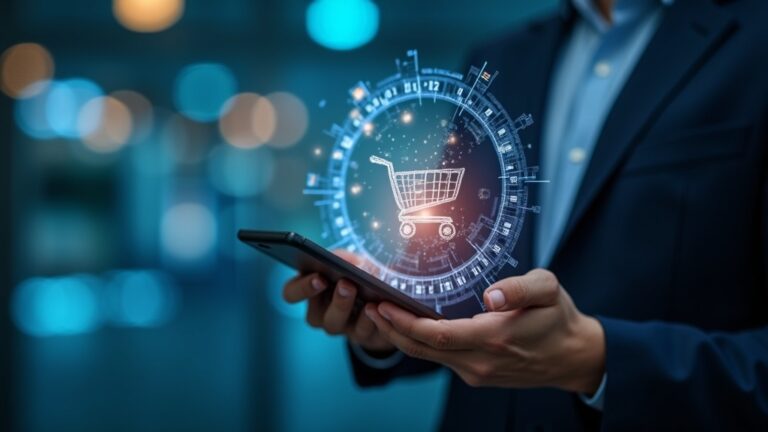The e-commerce sector has been a cornerstone of global retail, revolutionizing the way consumers shop and businesses operate. With the rapid advancements in technology, e-commerce is undergoing transformative changes that are driving innovation at an unprecedented pace. This article explores how technology is shaping the e-commerce landscape, enhancing customer experiences, and optimizing business operations.
Enhancing Customer Experience Through AI and Machine Learning
Artificial intelligence (AI) and machine learning (ML) have become integral to personalizing customer experiences in e-commerce. These technologies enable businesses to analyze vast amounts of data to understand consumer behavior and preferences. By leveraging AI, e-commerce platforms can offer personalized product recommendations, dynamic pricing, and targeted marketing strategies.
For example, AI-driven chatbots provide instant customer service, answering queries and resolving issues in real-time. This not only improves customer satisfaction but also reduces the operational costs associated with human customer service agents. Moreover, AI tools can predict trends and customer demand, allowing retailers to optimize inventory management.
AI and machine learning are pivotal in creating personalized shopping experiences, making them indispensable tools for modern e-commerce businesses.
The Role of Augmented Reality in E-Commerce
Augmented Reality (AR) is transforming the way consumers interact with products online. By allowing customers to visualize products in their real-world environment, AR bridges the gap between online and offline shopping experiences. This technology is particularly beneficial for sectors like fashion, home decor, and beauty, where visualization plays a crucial role in the purchasing decision.
Brands like IKEA and Sephora have implemented AR to enhance customer engagement. IKEA’s AR app allows users to place virtual furniture in their homes to see how it fits and looks, while Sephora’s virtual artist lets customers try on makeup products virtually. Such innovations not only boost customer confidence but also reduce return rates.
Augmented Reality is redefining customer interactions by providing immersive and interactive shopping experiences.
Streamlining Operations with Automation
Automation technologies are streamlining e-commerce operations, from warehousing to order fulfillment. Automated systems can efficiently manage inventory, track shipments, and process orders, significantly reducing human error and operational costs. This ensures a smoother supply chain and faster delivery times, which are critical for customer satisfaction.
Robotic process automation (RPA) is particularly useful in handling repetitive tasks, freeing up human resources for more strategic roles. Additionally, automated marketing tools can manage email campaigns, social media posts, and customer feedback, ensuring consistent customer engagement.
- Improved inventory management
- Faster order processing
- Reduced operational costs
- Enhanced customer satisfaction
Blockchain Technology for Secure Transactions
Blockchain technology is increasingly being adopted in e-commerce to enhance security and transparency. By using decentralized ledgers, blockchain ensures secure and tamper-proof transactions, which is essential for building customer trust. This technology also facilitates faster cross-border payments and reduces transaction fees.
Moreover, blockchain can streamline supply chain logistics by providing end-to-end tracking of products. This transparency helps in identifying and resolving issues quickly, thus enhancing the overall efficiency of e-commerce operations.
| Benefits of Blockchain | Impact on E-Commerce |
|---|---|
| Enhanced Security | Prevents fraud and ensures data integrity |
| Transparency | Provides traceability of products |
| Cost Efficiency | Reduces transaction fees |
Emerging Trends and Future Prospects
The future of e-commerce is promising, with emerging technologies continuing to drive innovation. Voice commerce, using smart speakers and virtual assistants, is gaining traction as a convenient shopping method. Additionally, the integration of the Internet of Things (IoT) can enhance inventory management and personalized marketing.
As technology evolves, e-commerce businesses must stay agile, adopting new tools and strategies to meet changing consumer demands. The integration of 5G technology will further enhance mobile shopping experiences, making it more seamless and efficient.
Conclusion
Technology is undeniably a driving force in the evolution of the e-commerce sector. From AI and AR to blockchain and IoT, these innovations are enhancing customer experiences and optimizing business operations. As we look to the future, continuous technological advancements will undoubtedly shape the e-commerce landscape, offering new opportunities for growth and innovation.
FAQ
- How does AI improve customer experience in e-commerce?
AI enhances customer experience by providing personalized recommendations, efficient customer service through chatbots, and dynamic pricing. - What is the impact of AR on online shopping?
AR allows customers to visualize products in their real-world environment, improving engagement and confidence in purchasing decisions. - Why is blockchain important for e-commerce?
Blockchain ensures secure transactions, enhances transparency, and reduces costs, thereby building customer trust and streamlining operations.

